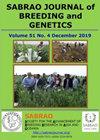乌兹别克斯坦小麦地方品种麦胶蛋白的多态性与遗传
IF 1.7
Q3 PLANT SCIENCES
引用次数: 2
摘要
在乌兹别克斯坦和其他中亚国家种植的小麦基因型在生产力方面无法与商业品种竞争。这些地方品种是宝贵的遗传资源,可用于开发富含营养微量元素和其他有益人类健康成分的新品种。作为小麦研究的结果,第一次在乌兹别克斯坦偏远地区以其自然形态保存了31个地方品种,包括通过确定其经济和形态价值特征而编制的目录。基于聚类分析和数量特征,在编制的树图中,小麦基因型可分为5类。通过树形图,确定古代地方小麦品种的形态属性成为现实,即使籽粒颜色相同,也有明显的差异,但基于保证籽粒产量的数量特征仍然相似。在古代地方小麦品种中,株高和千粒重与其他性状的相关性较弱,穗长和穗粒数与穗粒重的相关性较强。软质小麦地方品种籽粒麦胶蛋白的电泳图谱显示了籽粒麦胶蛋白的多态性。麦胶蛋白的电泳参数表明,在目录中所列的6个品种中,只有4个品种具有相似的电泳谱。在品种Ak-bugdoy的四个标本中,三个具有相同的光谱,而来自品种Surkhak的三个具有不同的光谱。根据小麦地方品种的个体选择和电泳谱分析,卡拉克塔什小麦品种的释放是由于其具有较高的烘焙和营养价值。本文章由计算机程序翻译,如有差异,请以英文原文为准。
POLYMORPHISM AND INHERITANCE OF GLIADIN PROTEINS IN WHEAT LANDRACES OF UZBEKISTAN
Wheat genotypes grown in Uzbekistan and other Central Asian countries cannot compete with commercial cultivars for productivity. These landraces are valuable genetic resources that could benefit in developing new cultivars enriched with nutritious microelements and other ingredients beneficial for human health. As a result of wheat research, for the first time, preserving the 31 landraces in their natural form in the remote territories of Uzbekistan ensued, including a catalog of compilation by determining their economic and morphologically valuable features. Based on cluster analysis and quantitative characteristics, local wheat genotypes attained five groupings with a compiled dendrogram. With the dendrogram, determining the morphological attributes of ancient local cultivars of wheat materialized, even though the grain color is the same, a sharp difference is noticeable, but still similar based on quantitative characteristics that ensure the grain yield. In ancient local wheat cultivars, plant height and 1000-seed weight have a weak correlation with other traits, and a strong positive association was distinct between the spike length and spikelets per spike and the number and grain weight per spike. The polymorphism of soft wheat landraces showed according to the electrophoretic spectra in the grain’s gliadin proteins. The electrophoretic parameters of gliadin proteins indicated that of the six samples of cultivar Kzyl-bugdoy listed in the catalog, only four have similar electrophoretic spectra. In cultivar Ak-bugdoy’s four specimens, three have identical spectra, while three from the cultivar Surkhak have different bands. Based on individual selection and according to electrophoretic spectra from wheat landraces, the release of the wheat cultivar Kairaktash was due to its high baking and nutritional value.
求助全文
通过发布文献求助,成功后即可免费获取论文全文。
去求助
来源期刊

Sabrao Journal of Breeding and Genetics
农林科学-奶制品与动物科学
CiteScore
1.90
自引率
50.00%
发文量
63
期刊介绍:
The SABRAO Journal of Breeding and Genetics is an international journal of plant breeding and genetics research and was first published in 1969. It is the official publication of the Society for the Advancement of Breeding Research in Asia and Oceania (SABRAO).
Its objectives are to: promote the international exchange of research information on plant breeding and genetics, by describing new research findings, or ideas of a basic or practical nature; and be a medium for the exchange of ideas and news regarding members of the Society.
The Journal gives priority to articles that are of direct relevance to plant breeders and with emphasis on the Asian region. Invited for publication are research articles, short communications, methods, reviews, commentaries, and opinion articles. Scientific contributions are refereed and edited to international standards.
The journal publishes articles for SABRAO members mainly. The Journal preferred strongly that at least one author should be a current member of the Society. Non-members may also publish in the journal.
 求助内容:
求助内容: 应助结果提醒方式:
应助结果提醒方式:


